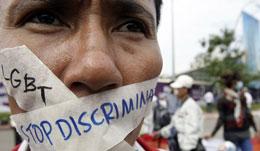Canada can push LGBTQ agenda in Asia

LGBTQ movements are gaining strength and prominence across Asia providing Canada with significant opportunities to be a leader for change, says a new report on Canada's support of gay community activism in the region.
The Canadian government has already taken steps on this front, announcing in June 2017 that Canada would co-chair the Equal Rights Coalition, the first intergovernmental coalition advancing LGBTQ rights, the report by the Asia Pacific Foundation noted.
With the Canadian government currently spending time and resources on supporting LGBTQ initiatives in Asia, the study is a first look at how exactly these resources are being focused to increase the cultural understanding of LGBTQ issues within Asia; to identify strengths and challenges in Canada’s current LGBTQ support efforts; and to provide recommendations on ways to improve Canada’s governance and best practices on this issue.
When compared to other regions in the world, Asia is less tolerant of LGBTQ rights movements than North America, Europe, and Latin America, but more tolerant than the Middle East and Africa, the report said.
In Asia, same-sex sexual activity is legal in 14 out of 24 countries. Many countries do not let openly gay, lesbian, or bisexual people serve in the military, and very few provide any legal protection against discrimination based on sexual orientation or gender identity. In Asian countries where same-sex activity is legal, LGBTQ people often face discrimination and violence from the government, their communities, and their families. Across Asia, however, there is a vibrant network of individuals and civil society organizations working to change this. In addition, there are members of the international community such as INGOs, the United Nations, and numerous governments working through their foreign affairs ministries to support LGBTQ initiatives. To date, the main avenue for the Canadian government’s international efforts have been through its missions abroad said the report, which looked at efforts in Taiwan, S.Korea and Myanmar.
TAIWAN
While Taiwan may be the most progressive on LGBTQ rights in the region, many LGBTQ people still face significant discrimination and lack of support, in particular the transgender community, as well as LGBTQ aboriginals. The Canadian Trade Office in Taipei (CTOT) has been very active in supporting LGBTQ civil society in Taiwan. It has supported a number of workshops, participated in multiple Pride parades and been outspoken in the media on LGBTQ rights. There have also been a number of non-government-related collaborations between Canadian and Taiwanese organizations. Activists found Canada has valuable and relatable experiences, especially on issues such as First Nations’ understanding of LGBTQ people, family legal rights, and educating youth, and that Canada took a consultative approach that integrated local needs and priorities.
MYANMAR
Myanmar one country where same-sex sexual activity is illegal. The key issues facing the Myanmar. The Canadian Embassy in Myanmar was initially very active in supporting LGBTQ organizations through participating in events such as the inaugural International Day against Homophobia, Transphobia, and Biphobia, and Myanmar’s first two queer film festivals. However, current Canadian Embassy representatives for the LGBTQ file have been less proactive.
SOUTH KOREA
While same-sex sexual activity is legal in Korea, anti-LGBTQ sentiments within religious and conservative groups have created a difficult environment for the Korean LGBTQ community. The Canadian Embassy in Korea is relatively new to supporting LGBTQ initiatives in the country; however, the embassy is making strides in networking with LGBTQ organizations and increasing its involvement.
The embassy has supported the past few Korean Queer Culture Festivals, including participating in the Pride parade. It has hosted an LGBTQ book talk featuring prominent Canadian activists, and, in the lead-up to the Pyeongchang Olympic Games in 2018, partnered with a local LGBTQ organization to host a Canadian sports writer and activist to speak on homophobia in sport.
INDIA
Since its debut in 2010, KASHISH Mumbai International Queer Film Festival has emerged as South Asia’s biggest LGBT film festival. The festival encourages a greater visibility of Indian and International queer cinema among both queer and mainstream audiences as a means to foster better understanding of queer thoughts, desires and expressions. The Consulate General of Canada in Mumbai has been an active participant of the festival and has committed to raising awareness and understanding of LGBT matters through community engagement. Lsts year Canada showcased 11 short films, including three in the international film competition over the course of the five-day line-up which included 182 films from 53 countries. Canada has also supported a panel discussion entitled “the Way Ahead on Section 377” to provide concrete next steps for Indian businesses to consider the Indian penal code that criminalizes homosexuality.
PHILIPPINES
On the surface, the Philippines may appear to be one of the more “liberal” ASEAN countries when it comes to the LGBT community. In a 2013 Pew Research Center report about global opinions of the LGBT community, more than 70 percent of Filipinos said homosexuality should be “accepted by society,” making the Philippines the most “tolerant” nation surveyed in the Asia-Pacific region after Australia. The Embassy of Canada in the Philippines provided support for a forum, entitled "Advancing the Campus Rainbow Agenda," that tackled the issues of sexual orientations and gender identities (SOGI) in the context of human rights. The target audience: student leaders of various colleges and universities. More than 140 members of the lesbian, gay, bisexual, and transgender (LGBT) community in the country have been killed in the past fifteen years making them a sector highly vulnerable to violence. These killings were allegedly motivated by hate and anti-gay sentiment.






